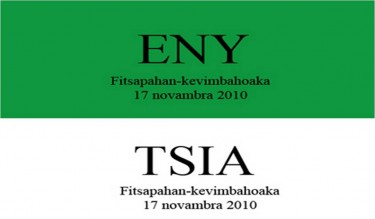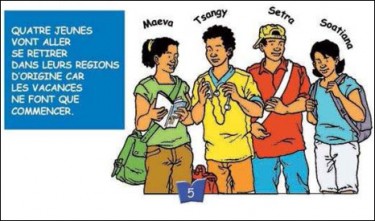It's been almost 20 months since the change of regime in Madagascar and the return to constitutional order still seems to be a long struggle for the embattled island. A referendum on a new constitution has been scheduled for November 17 (initially scheduled for August 12 [1]). The referendum is still heavily disputed by both the opposition and the international community that has withdrawn a few of their representatives [2] in the country because of the constitutional vacuum.
After hitting multiple road blocks and the absence of some of the original contributors [3](fr), the new constitution proposal [4] [fr] has been finalized this week. Many Malagasy bloggers have dissected, analyzed and reacted to the major points of the document.
On the blog Fijery, a lawyer and guest blogger Sahondra Rabenarivo highlights the shortcomings of the proposal and notes that this new proposal is essentially the same text as the former constitution drafted in 2007. She explains [5] [fr]:
Sur 160 articles à l’origine, hors dispositions transitoires, seules trois phrases ont été effacées ; environ 39 phrases, alinéas, paragraphes ou articles ont été ajoutés ; et 23 articles ou sous-articles ont été modifiés. La structure et les grandes rubriques de la Constitution de la 3è République demeurent donc inchangées, [..] les dispositions transitoires de ce texte prévoient le maintien au pouvoir non seulement de Andry Rajoelina mais aussi de toutes les institutions de la transition jusqu’à la mise en place des institutions de la soi-disant 4è République, sans date limite.
Patrick warns that some the proposal is already being modified by the constitutional advisory committee after the official document that was presented to the press on September 24. He points out that this post-conference imodification would essentially negate the clear separation of the executive power from the judicial power [6] [fr].
Madagoravox posts a comprehensive table [8] [fr] that reviews all the modifications and addendum to the constitution and what it means in layman's terms.
Nevertheless, a few minor proposed changes in the new text has already triggered a few discussions in the Malagasy blogosphere. For instance, It seems that the official languages will be effectively reduced to Malagasy and French [9] [fr], removing English as an official language. Blogger Razanajatoma also notes that the motto of the Republic would be changed [10] from “Tanindrazana, Fahafahana, Fandrosoana” ( “Fatherland, Liberty, Progress”) to “Fitiavana, Tanindrazana, Fandrosoana” ( “Love, Fatherland, Progress”). The irony of introducing “love” as an intricate part of the fabric of a nation still profoundly divided [11] is not lost on Citoyenne malgache [fr]. Madagate, a website ideologically close to the current government, argues that the addition of “love”in the new national motto would be in agreement with Malagasy's traditional spiritual sensibility [12] [fr].
Achille52 is not all that impressed with all the hype around this new constitution when he sees what is going on in the daily life of the population. He offers a list of practical decrees [13] that he would have liked to read in the text [fr]:
Que les prix des PPN ne font pas le yoyo au gré des spéculateurs
Que les policiers ne demandent pas des pots de vin à chaque occasion
Que les hôpitaux guérissent les malades au lieu de les tuer
Qu’on ne nous vende plus des aliments périmés sous prétexte que c’est bon marché
Qu’on ne pille plus les forêts pour construire des opéras en Chine
That policemen quit asking for bribes every single time
That hospitals actually heal patients and not ill them.
That expired foods are no longer being sold under the pretense that it's cheap
That we stop pillaging our forests to build opera houses in China.
On the subject of the illegal logging of rosewood in Madagascar [14], Foko [15]and ICE club [16] bloggers have urged their readers to sign a petition drafted by the World Wildlife Fund [17] (WWF) and addressed to the transitional president Andry Rajoelina and his director of cabinet Zaza Manitranja Ramandimbiarison that demands an immediate stop to the illegal logging activities and the concrete application of the decree 2010-141 banning rosewood logging and export.
Unsurprisingly, Madagascar has dropped from 56 to 48 [18] in the latest edition of the Ibrahim Index of African Governance.
Supporters of the new constitution argue that it is the only way to exit the current political quagmire and move the country towards reconciliation. The director of Rajoelina's cabinet addressed an open letter towards two former presidents of Madagascar [19] [fr], pleading for them to join and support the effort of the transition to move forward towards reconciliation.
On my Mydago, Solo Razafy compares and contrasts the process towards a new constitution in Madagascar today and in South Africa in 1990 and the need for more information and awareness about the constitution. He posts a reflection by the aforementioned lawyer Sahondra Rabenarivo [21] [mg/fr]:
l’approche pragmatique de la RSA quand à la « réconciliation nationale » fut de mettre en place des commissions droits de l’homme, égalité des genres, etc au sein même des institutions constitutionnelles. Ces commissions sont chargé de suivre la mise en oeuvre des principes constitutionnels d’égalité devant la loi et de protection des droits de l’homme.
Là où je veux en venir… la communication et la transparence, d’un côté, l’importance de l’aspect « instructif », d’autre part.[..] le « plus jamais ça » ne commencera qu’avec la campagne de sensibilisation soutenue et honnête sur le contenu de la Constitution [..] oui, on me dira, la RSA a plus de ressources, la communauté internationale était beaucoup plus impliquée, etc, etc, je cherche tout juste à dire qu’ils ont surmonté le problème de manque d’éducation et ont cherché à avoir une vraie légitimité d’une manière admirable.

